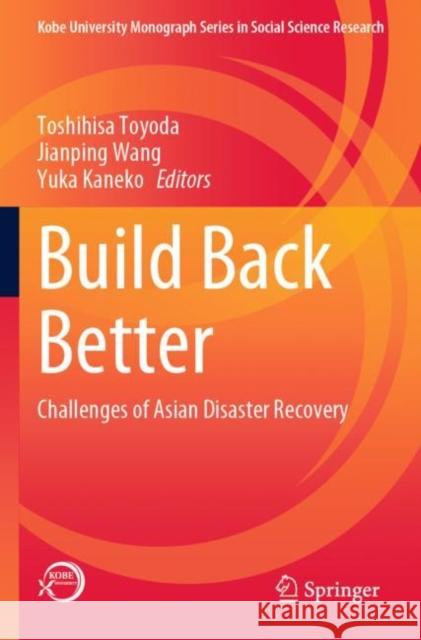Build Back Better: Challenges of Asian Disaster Recovery » książka
Build Back Better: Challenges of Asian Disaster Recovery
ISBN-13: 9789811659812 / Angielski / Miękka / 2022 / 214 str.
Build Back Better: Challenges of Asian Disaster Recovery
ISBN-13: 9789811659812 / Angielski / Miękka / 2022 / 214 str.
(netto: 585,86 VAT: 5%)
Najniższa cena z 30 dni: 539,74
ok. 16-18 dni roboczych.
Darmowa dostawa!
International society led by the United Nations has been working to improve and standardize every country's post-disaster recovery policy. In particular, the Sendai Framework for Disaster Risk Reduction adopted at the UN World Conference at Sendai, Japan, in 2015 declared the slogan "Build Back Better (BBB)." In this book, the BBB is considered an essential common criterion for evaluating recovery status, but BBB variations in each individual country's context are pursued. In contrast to a governmental approach to recovery evaluation focusing mainly on physical structures and macro indicators, this volume focuses more on the affected societies, communities, economies, and especially victims' livelihoods. The authors are academics from diverse fields, including governance, law, economics, and engineering, so that the book is truly interdisciplinary.This collection results from an international collaboration by scholars from "disaster-affected universities" in global-scale mega-disasters occurring in the Asian region in recent decades. The universities include Kobe University in Japan; Iwate University in Japan; Syiah Kuala University in Aceh, Indonesia; Sichuan University in China; and the University of the Philippines.
International society led by the United Nations has been working to improve and standardize every country's post-disaster recovery policy. In particular, the Sendai Framework for Disaster Risk Reduction adopted at the UN World Conference at Sendai, Japan, in 2015 declared the slogan "Build Back Better (BBB)." In this book, the BBB is considered an essential common criterion for evaluating recovery status, but BBB variations in each individual country's context are pursued. In contrast to a governmental approach to recovery evaluation focusing mainly on physical structures and macro indicators, this volume focuses more on the affected societies, communities, economies, and especially victims' livelihoods. The authors are academics from diverse fields, including governance, law, economics, and engineering, so that the book is truly interdisciplinary.This collection results from an international collaboration by scholars from "disaster-affected universities" in global-scale mega-disasters occurring in the Asian region in recent decades. The universities include Kobe University in Japan; Iwate University in Japan; Syiah Kuala University in Aceh, Indonesia; Sichuan University in China; and the University of the Philippines.











